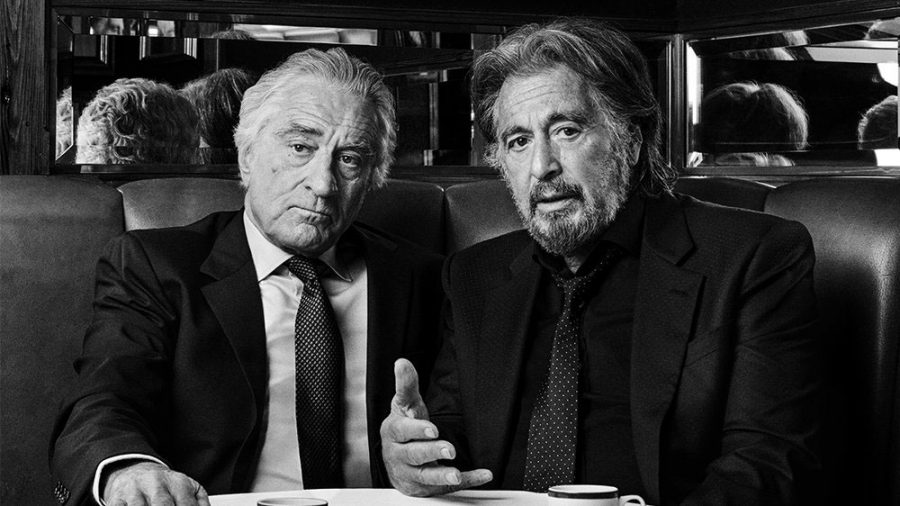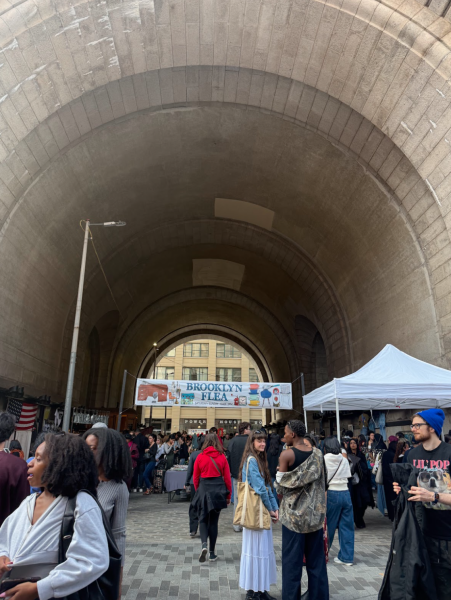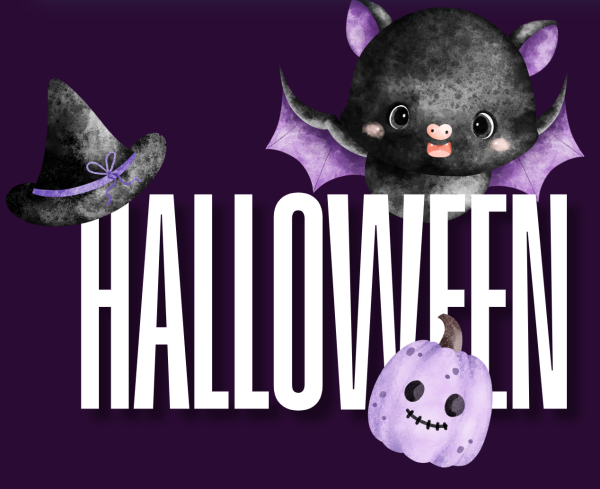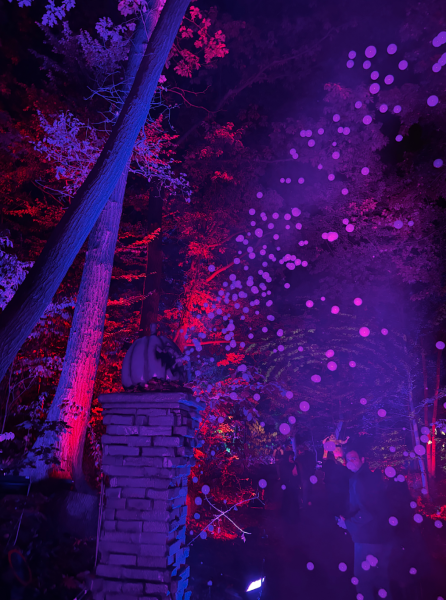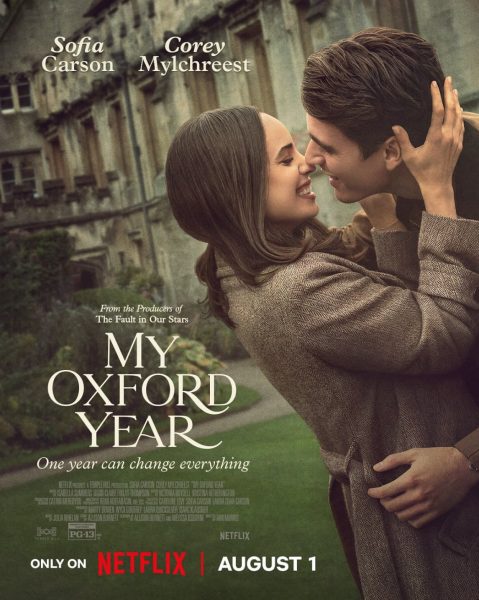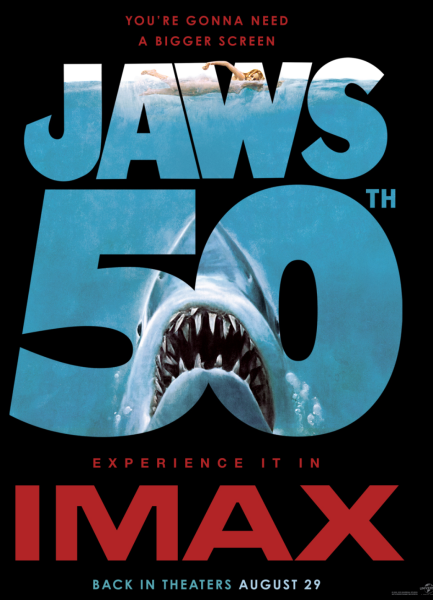“The Irishman” Cements Scorsese’s Legacy
Robert Di Nero and Alfredo Pacino star in Martin Scorsese’s “Irishman” as Frank Sheeran and Jim Hoffa, respectively. (Courtesy of Twitter)
“The Irishman” is the newest film by veteran director Martin Scorcese, adapted from the discredited book “I Heard You Paint Houses.” While “The Irishman” isn’t Scorcese’s best work, it emanates a unique power.
The events of “The Irishman” are presented through the narration of mob hitman Frank Sheeran (Robert De Niro). Nicknamed “The Irishman,” he ends up as the bodyguard and confidant of Jimmy Hoffa (Al Pacino). He goes from burning down laundromats for quick cash to being involved in criminal empires and their dealings with the United States government.
While the source material of “The Irishman” is questionable, the film doesn’t present itself as a historical work. For much of its running time, Frank and Hoffa’s forays into the crime-infested underworld end up as a sort of dark comedy. Every actor gives an exaggerated performance, paired with writing that emphasizes the absurd realities of their respective historical figure. The moral complexities are still maintained, as the film is quick to remind you of the grim results of their activities.
Al Pacino’s interpretation of Jimmy Hoffa as a boisterous, larger-than-life icon encapsulates this. His more admirable qualities are paired with extreme arrogance, including his cooperation with criminals and corrupt politicians. As comedic as Pacino’s role is, Hoffa still serves as a tragic antihero and flawed human being.
As with the rest of the film, “The Irishman” draws more from culture than history when presenting events like Watergate, the Bay of Pigs invasion and the Kennedy Assassination. Frank’s drawn-out narrative presents these events through the public and personal reactions to them. It’s difficult to criticize “The Irishman” for historical inaccuracy when it only cares about the emotions created by these events and figures.
“The Irishman” feels almost goofy at times, but the graphic violence keeps it in check. Scorcese takes plenty of liberties throughout the film, but the shootings and brawls are uncharacteristically grounded. They’re presented without fanfare as vicious affairs dominated by one side. As with the rest of Scorcese’s work, violence is featured heavily but never glorified.
An appropriate handling of violence is just one aspect of the film’s impressive visuals. CGI is used convincingly to age down De Niro, Pacino and Joe Pesci’s characters. It’s a far cry from the rubbery young Jeff Bridges that terrorized “Tron Legacy” a decade ago.
The film also recreates the bygone America of the 1960s, though it falls short of the obsessively detailed reconstruction seen in “Once Upon a Time in Hollywood” a few months earlier. Some brilliant camera work is mired by a lack of restraint, as gimmicky decisions ruin otherwise splendid sequences.
Unfortunately, camera work isn’t the only place where “The Irishman” fails to keep itself in check. The film is three and a half hours long and much of that is padded out by meandering conversations and questionable tangents. The pacing is erratic throughout the whole movie and, at times, “The Irishman” doesn’t seem to know where it’s going.
One of the more interesting decisions in the film is a symptom of this. The film pauses when introducing certain historical figures, listing their names alongside the dates and causes of their death. It goes a long way to establish the tone and message of “The Irishman.” After a certain point, those constant interruptions remind the viewer just how much is being introduced so late into the film.
Most of the last half hour is dedicated to Frank’s final days, as his few surviving partners in crime succumb to age and disease. In most respects, it’s the strongest part of “The Irishman.” It carries a unique mix of despair and retribution, as well as the counter to the crime films that defined Scorcese’s generation of filmmakers. Despite their best intentions, their work often glorified the lifestyles of its criminal protagonists.
In “The Irishman,” even the mobsters who came out on top lose everything in the end. Unfortunately, the last act paradoxically feels like the natural conclusion to Frank’s story, while also a separate narrative in its own right. Much like the rest of “The Irishman,” that section’s strengths are what prevent it from being truly great cinema.
In somewhat of a controversy, Scorsese recently compared the Marvel Cinematic Universe, which includes “Avengers: Endgame” and “Captain Marvel,” to theme parks. He accused them of lacking some fundamental filmic quality in their emphasis on spectacle.
Regardless of whether that’s true, you can’t say the same about his own work. “The Irishman” is lacking in many ways, but is still worth watching for the powerful experience it offers.





































































































































































































